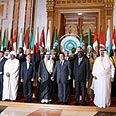
Arab League summit in Saudi Arabia (archive photo)
צילום: איי אף פי
In praise of Arab unity
United Arab front, feared by Israel in past, may present opportunity for change, says former Mossad head
Far-reaching opportunities for change are unnoticeably taking shape in the basic principles of Israel's foreign affairs and defense policies.
Let's focus on one of them: Since the War of Independence, Arab unity has been perceived as a threat to Israel's security. Israel, with all its overt and covert governing institutions, has invested much effort in breaking this wall – either by war or covert diplomatic persuasion.
A major crack in Arab unity occurred when Israeli and Egyptian representatives met secretly in 1977 in Morocco under the patronage of King Hassan II. The peace agreement between the two countries became a precedent, and has since led to separate talks between Israel and each of its rivals.
The confidential talks with the Palestinians at Oslo struck a heavy blow at the united Arab camp. The separate peace agreement with Jordan in 1994 was the third step, and the separate talks with Syria were designed, among other things, to strike the final blow at the vision of a unified conflict.
We saw tangible proof of the expanding crack in the wall of unity during the five years of the second intifada, where at its height Jordan and Egypt refused to take any significant measures against Israel. The Syrian army didn't fire a single bullet at Israel in support of the Palestinians, and this was while the IDF in fact took over Judea and Samaria within the framework of the Defensive Shield campaign.
The Saudi initiative of 2002, which surprised Israel's leadership at the time, was perceived as dangerous because it included among other things the Palestinian refugees' right of return as an ultimate condition. This, of course, could not and cannot be accepted.
Unfortunately, senior aides to the prime minister at the time sabotaged all talks with Arab states as a single body, even though it was known then that a substantial group of countries wishing to engage in talks with Israel on the future of the Palestinians was organizing itself around Saudi Arabia.
This generation has not yet learned to think in terms of exchanging the trauma of a united Arab world during wartime with Arab unity for the sake of an agreement.
Complex challenge for Israel
Five costly years have elapsed, and now the Arab world is once again proposing talks ahead of a deal. This very same Arab world views the developments among the Palestinians as a serious threat to stability throughout Islamic states.
Saudi Arabia, therefore, is intervening in the Palestinian administration's internal politics and is attempting to manage the internal conflict between the Fatah and Hamas factions. Hence, the Arab world is preparing itself for negotiations with Israel, and may perhaps even remove the leadership from Palestinian hands and take it into its own.
Preparing for such talks poses a complex challenge for Israel. Demands made by the Arab world are tough, and some are even expressly unacceptable.
Yet we must pay attention to the fact that even if in the past we justifiably believed that a united Arab world would fall in line with the most radical of its ranks – we are being presented with an opportunity to examine whether the circumstances have changed and whether the moderate majority will force the radicals to fall in line with them.
The Mecca agreement forced on Hamas and the Hamas-Fatah unity government ratified at the Riyadh summit present the Israeli government with the tools for bold and creative diplomacy.
This opportunity will not last forever. The ongoing developments in the Palestinian territories do not leave us more than a few weeks to catch this bull by the horns.
The writer is a former head of the Mossad.










